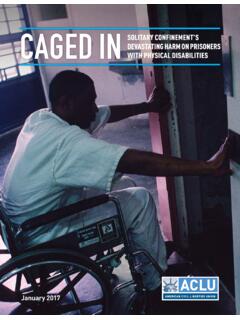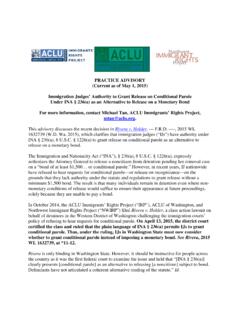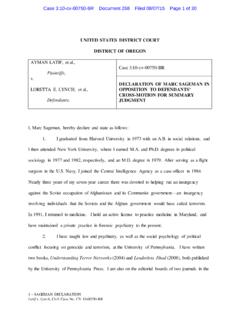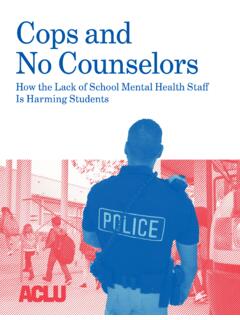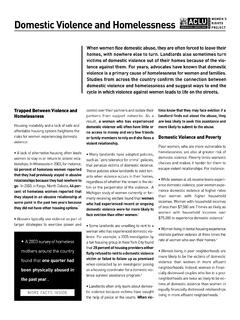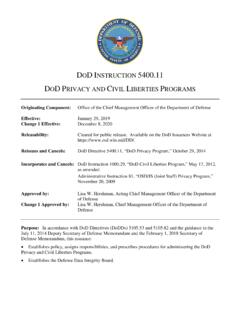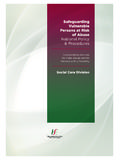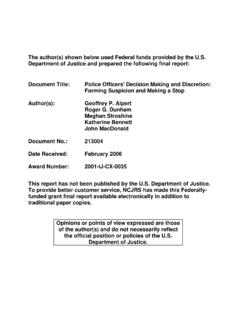Transcription of Ethics and Standards - American Civil Liberties Union
1 Policy 105 Newberg-Dundee Police Department Policy Manual Professional Ethics and Standards PURPOSE AND SCOPE The purpose of this policy is to provide the members of this department with clearly articulated expectations of their performance relative to employment with this agency. PREAMBLE Whereas, peace officers are vested with a public trust which requires that they consistently demonstrate the highest degree of integrity and good moral character; and Whereas, the need to maintain high Standards of moral character, integrity, knowledge, and trust is advanced by the establishment of Standards of Conduct for members of the law enforcement procession; Whereas, the establishment of Standards of Conduct, which includes a Code of Ethics , Canons of Ethics , Oath of Office, Mission Statement and minimum Standards , requires the granting of authority to enforce these Standards of professional conduct through disciplinary action as necessary for the protection of the health, welfare and safety of the public.
2 Therefore The need to maintain high Standards of moral character, integrity, knowledge, and trust require that members of the Law Enforcement Profession establish and conform to Standards of Conduct. GENERAL STATEMENT Members of the Law Enforcement Profession are granted a public trust which requires that they consistently demonstrate the highest degree of integrity. To be worthy of this public trust, and to ensure that their professional conduct is above reproach, members of the law enforcement profession must conform to these Standards of Conduct and must abide by these Canons of Ethics , adopted as a means of internal regulation. The essence of a profession is that it requires, in addition to prescribing a desired level of performance, established minimum Standards of ethical conduct with prescribed rules for internal discipline to ensure compliance.
3 Accordingly, these Standards of Conduct have been established for the law enforcement profession. Nothing in the Standards of Conduct is intended to limit or supersede any provision of law relating to the duties and obligations of peace officers or the consequences of a violation thereof. Where these rules specify certain conduct as unprofessional, this is not to be interpreted as approval of conduct not specifically mentioned. Nothing in the Standards of Conduct is intended to limit the authority of this agency to adopt and enforce rules and regulations that are more stringent or comprehensive than those that are contained here. Standards of conduct are established with the belief that they are reasonably related to the business needs of this police department.
4 Business need is generally, but not exclusively described as the type of performance that can be expected for the orderly, efficient, effective and safe operation of the department. Additionally, because we, in law enforcement, are obligated by our oath to affect the rules of a civilized society, it is reasonable that we be held to the highest of Standards in our professional and personal conduct. The enormity of Professional Ethics and Standards -12 Adopted: 2010/11/19 1995-2010 Lexipol, LLC - 29891 -Newberg-Dundee Police Department Policy Manual Professional Ethics and Standards potential situations in which an employee may become involved then, requires extensive discussion to define acceptable and unacceptable conduct. It is the policy ofthis department therefore, to provide clear written direction of expected and prohibited activities by members of this agency.
5 DEFINITIONS Peace Officer means a commissioned regular officer, and by extension and where applicable any other paid or volunteer member of the Department. Canons are statements that express in general terms Standards of professional conduct expected of peace officers in the relationship with the public, the criminal justice system and the profession. They embody the general concepts from which the Ethical Standards and the Disciplinary Rules are derived. Ethical Standards are statements that represent the objectives toward which every peace officer shall strive. They constitute guiding principles that can be relied upon by the peace officer in certain specific situations. Standards specify an acceptable level of conduct for all peace officers, regardless of their rank or the nature of their assignment.
6 Any peace officer who violates any agency rule that applies to these canons and Standards commits unprofessional conduct, and is subject to disciplinary action. Violation of disciplinary rules requires appropriate adjudication and disciplinary action ranging from oral reprimand to termination and/or criminal prosecution or other administrative action sanctioned by law, as dictated by the individual case. Enforcement Procedures are the fundamental rights of an accused officer that are applicable to a disciplinary investigation or proceeding against the officer. Administrative Investigation is an investigation conducted to determine whether an officer has violated any provision of this code, or an agency rule or regulation; or whether an officer is impaired or unfit to perform the duties and responsibilities of a peace officer.
7 Formal Discipline refers to the final adjudication of administrative or disciplinary charges. Controversial conduct shall be defined as that conduct which may damage the reputation of the department or bring it or the member into disrepute. LAW ENFORCEMENT CODE OF Ethics The law enforcement code of Ethics is adopted as a general standard of conduct and policy for officers of this agency. "As a law enforcement officer, my fundamental duty is to serve mankind; to safeguard lives and property, to protect the innocent against deception, the weak against oppression or intimidation, and the peaceful against violence or disorder; and to respect the Constitutional rights of all men to liberty, equality and justice. "I will keep my private life unsullied as an example to all; maintain courageous calm in the face of danger, scorn, or ridicule; develop self-restraint; and be constantly mindful of the welfare of others.
8 Honest in thought and deed in both my personal and official life, I will be exemplary in obeying the laws of the land and the regulations of my department. Whatever I see or hear of a confidential nature or that is confided to me in my official capacity will be kept ever secret unless revelation is necessary in the performance of my duty. Professional Ethics and Standards -13 Adopted: 2010/11/19 1995-2010 Lexipol, LLC - 29892 -Newberg-Dundee Police Department Policy Manual Professional Ethics and Standards "I will never act officiously or permit personal feelings, prejudices, animosities, or friendships to influence my decisions. With no compromise for crime and with relentless prosecution of criminals, I will enforce the law courteously and appropriately without fear or favor, malice or ill will, never employing unnecessary force or violence and never accepting gratuities.
9 "I recognize the badge of my office as a symbol of public faith, and I accept it as a public trust to be held so long as I am true to the Ethics of the police service. I will constantly strive to achieve these objectives and ideals dedicating myself to my chosen profession .. law enforcement." CANONS OF Ethics Canon One PEACE OFFICERS SHALL UPHOLD THE CONSTITUTION OF THE UNITED STATES, THE STATE CONSTITUTION AND ALL LAWS ENACTED OR ESTABLISHED PURSUANT TO LEGALLY CONSTITUTED AUTHORITY. (a) Peace officers shall recognize that the primary responsibility of their profession and of the individual officer is the protection of the people within the jurisdiction of the United States through upholding of their laws, the most important of which are the Constitution of the United States and the State Constitution and laws derived therefrom.
10 (b) Peace officers shall be aware of the extent and the limitations of their authority in the enforcement of the law. (c) Peace officers shall diligently study principles and new enactments of the laws they enforce. (d) Peace officers shall be responsible for keeping abreast of current law as applied to their duties. (e) Peace officers shall endeavor to uphold the spirit of the law, as opposed to enforcing merely the letter of the law. (f) Peace officers shall respect and uphold the dignity, human rights and Constitutional rights of all persons. Canon Two PEACE OFFICERS SHALL BE AWARE OF AND SHALL USE PROPER AND ETHICAL PROCEDURES IN DISCHARGING THEIR OFFICIAL DUTIES AND RESPONSIBILITIES. (a) Peace officers shall be aware of their lawful authority to use the force reasonably necessary in securing compliance with their lawful enforcement duties.


